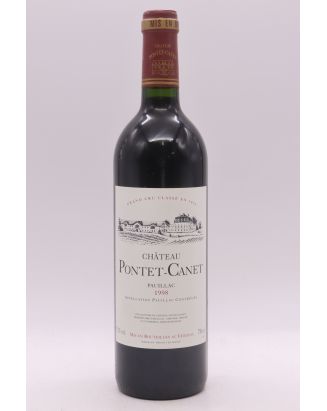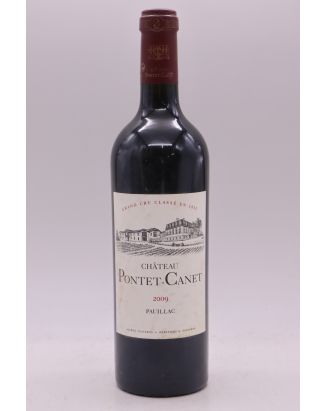







Founded in the early 18th century by Jean-François de Pontet, governor of the Médoc and grand equerry to the king, Château Pontet-Canet has traversed the ages, retaining a unique character within the Bordeaux vineyard. Originally, Pontet united several plots in Pauillac, in a place called Canet. A few decades later, his descendants continued the expansion of adjacent vineyards, thus forging the reputation of this property.
The château quickly gained prestigious recognition. In 1855, it was classified as a Fifth Growth in the famous Médoc wine classification, confirming its place among the Bordeaux wine elite. In 1865, Herman Cruse, an influential merchant, bought the estate, modernised the facilities and made Pontet-Canet wine known internationally. The Cruse family would remain owners for 110 years, before selling the estate in 1975 to Guy Tesseron, a cognac magnate. Since then, the Tesseron family, with Alfred Tesseron at its head since 1994, has continuously elevated Pontet-Canet to the summit of Médoc wines, leading a true revolution in the way of cultivating and vinifying.
Under the direction of Jean-Michel Comme, technical director for 30 years, the château was one of the first classified growths to switch to biodynamics. This decisive turn allowed the estate to reconnect with natural practices, while strengthening the quality and identity of its wines. Today, Justine Tesseron, Alfred's daughter, ensures the continuity of this family adventure, while bringing a touch of modernity.
The 2010 and 2009 vintages of Château Pontet-Canet are rated 100/100 by Robert Parker, the 2016 and 2018 vintages reached 98/100, celebrating the richness and depth of this grand cru.
The 81 hectares of Pontet-Canet's vines are ideally located in the famous Pauillac appellation, neighbouring the prestigious châteaux Mouton Rothschild and Lafite Rothschild. The terroir, situated on the left bank, is distinguished by its diversity and richness, spread over about a hundred different plots.
The heart of the vineyard rests on the "Plateau", a ridge of Garonne gravel from the Günz period, a poor and well-drained soil, perfect for the region's emblematic grape variety: Cabernet Sauvignon. Representing over 60% of the grape varieties, this variety confers structure and longevity to Pontet-Canet wines. Some vines, over 50 years old, plunge deeply into the limestone soil, producing the estate's best grapes.
On the edge of the estate, other plots, closer to the river, present a clay-limestone soil. This fresher and more fertile land is ideal for Merlot, which represents about 30% of the grape varieties. Merlot brings roundness and suppleness to the wine, thus balancing the power of Cabernet Sauvignon. Petit Verdot (2%) and Cabernet Franc (4%) complete the blend, offering spicy and floral nuances to the wine.
This plot-by-plot approach, combined with manual management of the vines, allows each vine to express itself fully. Since 2008, draft horses, such as Percherons, have replaced tractors to avoid soil compaction, promote biodiversity and preserve the natural balance of the vineyard.
Vinification at Château Pontet-Canet is based on a philosophy of respect for the terroir and minimalist intervention, a key principle of biodynamics. The entire vineyard has been certified organic and biodynamic since 2010, after several years of successful experimentation. The estate aims to express the essence of the terroir through its wines, while limiting the use of chemicals and relying on manual practices.
The harvest is carried out by hand, with rigorous sorting of the grapes, which are then transferred by gravity into small conical vats for precise plot-by-plot vinification. This process allows for respecting the integrity of the fruit and extracting the best from each plot.
The wine ageing lasts between 16 and 18 months, depending on the vintage. Half of the production is aged in new barrels, while about 30 to 40% of the wines are aged in concrete amphorae (dolia), a practice implemented in 2012. These amphorae, made from local materials (gravel and limestone), allow for natural micro-oxygenation of the wine, thus preserving its purity and balance without artifice. The rest of the wines are aged in "once-used" barrels for a more subtle ageing. This process gives Pontet-Canet wines remarkable depth and precision.
Château Pontet-Canet offers a single main cuvée, derived from the entire production of the vineyard, since the decision was made to no longer produce a second wine. This approach ensures that all the estate's efforts are devoted to producing a unique grand vin that reflects the diversity and richness of the estate's terroirs.
Château Pontet-Canet - Grand Vin
This wine is the jewel of the estate, resulting from a blend dominated by Cabernet Sauvignon (about 62%), complemented by Merlot (32%), Cabernet Franc (4%) and Petit Verdot (2%). The grand vin of Pontet-Canet is known for its contained power, impressive tannic structure and incredible elegance. In tasting, it reveals complex aromas of black fruits, spices, graphite, with a silky texture and a long mineral finish. Its aromatic purity is a direct reflection of the biodynamic work, allowing the terroir to express itself fully, vintage after vintage. It is a wine for ageing par excellence, capable of evolving beautifully over several decades.
Pauillac, one of the most prestigious appellations in the Médoc, ranks among the great Bordeaux wines, with remarkable vintages that have made history. Among the finest vintages are those from 1975, 1982, 1985, 1986, 1989 and 1990, renowned for their complexity and longevity. The years 1995, 1996, 2000, 2003 and 2005 also stand out for their richness and power. More recently, the vintages 2008, 2009, 2010, 2012, 2014, 2015, 2016, 2017, 2018, 2019 and 2020 have confirmed Pauillac's exceptional potential, offering wines that are both elegant and powerful, perfect for long-term cellaring.
The Fifth Classified Growths offer a beautiful diversity of properties in the Médoc, testifying to Bordeaux's winemaking expertise. In Pauillac, one finds renowned estates such as Château d'Armailhac, Château Batailley, Château Clerc Milon, Château Croizet-Bages, Château Grand-Puy Ducasse, Château Grand-Puy-Lacoste, Château Haut-Bages Libéral, Château Haut-Batailley, Château Lynch-Bages, Château Lynch-Moussas, Château Pedesclaux, and Château Pontet-Canet. In the Haut-Médoc, Château Camensac and Château Cantemerle stand out with their own characteristics. In Margaux, Château Dauzac and Château du Tertre bring a touch of elegance, while Château Cos Labory from Saint-Estèphe completes this prestigious selection. Each of these estates reflects a unique facet of the Bordeaux terroir.
Château Pontet-Canet now stands as one of the great names of Bordeaux, admired for its audacity and ecological commitment. By relying on ancestral methods, while integrating modern innovations, the estate has managed to produce wines of exceptional quality, combining finesse, depth and character. With meticulous attention paid to every stage of production, from vine cultivation to ageing in amphorae, Pontet-Canet distinguishes itself through an approach respectful of nature and unparalleled know-how.